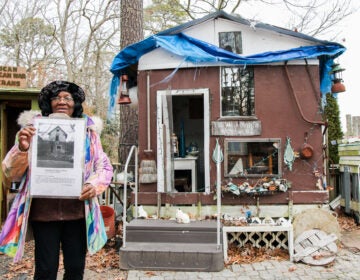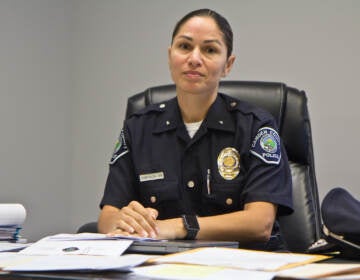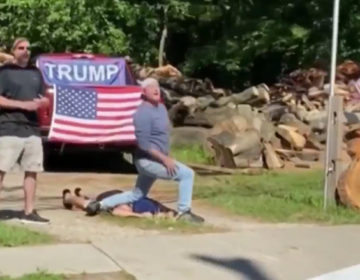N.J. rolls out ads on safe traffic stops; critic calls campaign ‘victim-blaming’
Safe Stop aims to inform the public about traffic stop protocols, but a South Jersey social justice activist believes police should be held more accountable than motorists.
Listen 4:36
Montclair Police Detective Kim Nelson Edwards is featured in an ad aimed at easing tensions during traffic stops. (New Jersey Department of Law and Public Safety)
Stay in the car.
If it’s dark out, turn on your dome light.
You have to show the officer your ID, but you don’t have to answer any questions after that.
Those are a few tips for drivers who have been pulled over by police, highlighted in a new public information campaign in New Jersey called “Safe Stop.”
The effort by the state attorney general’s office is twofold: educate motorists on what to do during a traffic stop and explain what they can do if they feel police mistreated them.
Top law-enforcement officials want to improve trust between police and the public, which they say has deteriorated in recent years amid high-profile shootings by cops and a national conversation on policing and racial bias.
“The only thought here is, let’s educate as many people as are willing to be educated, and if that leads to safer stops, then wonderful,” said Elie Honig, who directs the office’s Division of Criminal Justice.
“It’s not about blame. It’s not about politics,” he said. “It’s about safety, period.”
Critics have called the campaign “victim blaming,” suggesting that police officers — not drivers — bear the bulk of responsibility for keeping traffic stops professional and safe.
Former Attorney General Christopher Porrino began the program in November after he noticed that several violent incidents involving police were causing a rift between cops and the public. (Gurbir Grewal was sworn in as the state’s new attorney general Tuesday.)
In 2015, a South Carolina police officer shot Walter Scott in the back, killing him, as he fled from his car after being pulled over for a broken tail light. A year later, Philando Castile was shot dead in the driver’s seat of his car in Minnesota, after an officer thought Castile was pulling a gun.
Also in 2016, former Army reservist Micah Xavier Johnson killed five Texas police officers in a sniper attack that wounded several others.
Much of the resulting national conversation has focused on retraining police officers, but officials in New Jersey also wanted to connect with people on the other side of the issue: citizens.
Safe Stop reaches the public in several ways. The attorney general’s office has legal tips and information on its website, including step-by-step instructions about what to do when you’re pulled over. (“We’ve spoken with teenagers who believed, wrongly, that if they’re pulled over, the first thing they should do is get out of their car,” Honig said.)
The most visible part of the campaign is a series of videos, aired on TV and in movie theaters, featuring local cops, community activists, and celebrities including Shaquille O’Neal.
In addition to the public outreach, the state also set up a hotline and website for residents to submit complaints against police that they felt were ignored or mishandled by the local department.
Honig said the idea for Safe Stop arose after the attorney general’s office took steps to improve police-community relations in New Jersey that were largely focused on cops. Over the past few years, the state gave out grants for thousands of new body cameras for police officers across the state and updated its guidelines for investigating shootings by police.
Porrino also created a new continuing-education program for police officers that included training in cultural awareness, community policing, and de-escalation tactics.
According to data provided by the office, Safe Stop has cost about $1.4 million so far, including production and advertising costs. It was paid for using civil asset-forfeiture funds, money seized from suspected criminals.
Outreach campaigns such as Safe Stop typically don’t come from government agencies but rather from grass-roots efforts in low-income neighborhoods where residents feel more fearful about interacting with police, according to Dr. Meghan Stroshine, a professor at Marquette University who has studied traffic stops.
Stroshine added that, if paired with enhanced police training, Safe Stop would help break down the barrier between cops and civilians, which is often the root cause of a stop that ends badly.
“A lot of traffic stops start in a very mundane fashion, and then they escalate out of control because of those misunderstandings and miscues and misperceptions,” she said.
Groups that have partnered with the attorney general’s office on the Safe Stop program include other law-enforcement agencies, religious leaders, the American Civil Liberties Union, and the NAACP. But not everyone is on board.
“I think it’s victim-blaming. It’s putting the accountability on the motorists when there should be accountability on the officers,” said Walter Hudson, founder of National Awareness Alliance, a South Jersey-based social justice group.
“We’ve seen traffic stops … where people complied, they did the right thing, they showed their credentials, and they still ended up dead,” he said.
Hudson, who once considered becoming a cop himself, has spent his career as a social justice advocate calling attention to police misconduct in South Jersey.
Although the Penns Grove activist acknowledges that being a cop is a tough job, he noted that the power dynamic is tipped in favor of the police during a traffic stop.
Given recent high-profile incidents involving white police officers and black motorists, Hudson, who is black, said traffic stops have become increasingly unnerving.
“I’m nervous when I get pulled over, because you don’t know how that stop is going to turn out.”
WHYY is your source for fact-based, in-depth journalism and information. As a nonprofit organization, we rely on financial support from readers like you. Please give today.




